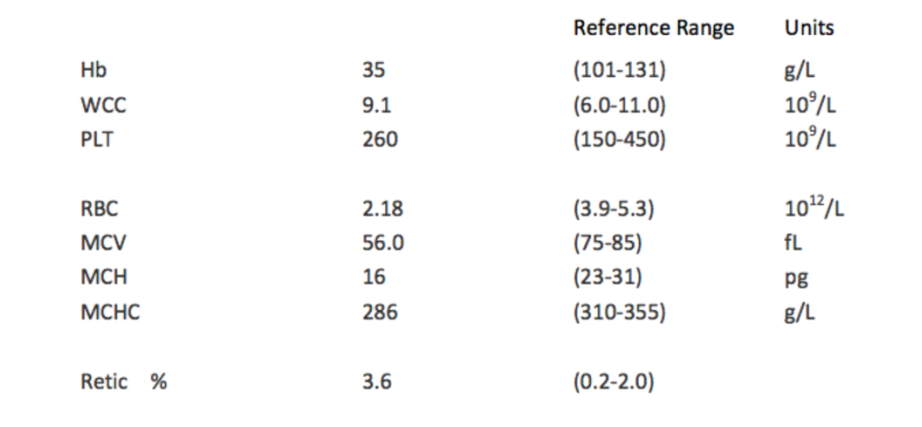MODULE 13
A little bit of an easier module, which is good news for those a bit behind after the roadblock. Haematology and oncology are huge specialties, but from the perspective of a FACEM less is required. You should aim to:
- have an understanding of the clinical and laboratory presentations of haematology malignancies
- be able to work through transfusion complications
- be rock solid on the management of reversal of anticoagulation
- understand the complicating oncology issues of febrile neutropaenia and tumour lysis syndrome
- have a framework for understanding anaemia
watch.
Below is a video on anaemia from the University of Louisville Faculty of Internal Medicine. It's long, but it provides a good overview of the causes and evaluation of anaemia. We've always liked it as a way to run through anaemia that doesn't involve reams of textbooks and falling asleep over the page. Feel free to skip through it as you need.
READ
There are a couple of topics that continually cause consternation amongst exam candidates: transfusion reactions and haematologic malignancies. Below are two sets of fellowshipexam.com notes on the topics for you to have a look at. These notes are designed to be reductionist rather than exhaustive, and try as much as possible to relate the two subjects back to the ACEM fellowship exam. Use them as a springboard to build on your knowledge and annotate accordingly. If there's any big stuff you think needs inclusion, or you have a profound insight into the topics please feel free to share on the FB site. We also have the latest MJA guidelines on warfarin reversal. These are need to know! Enjoy.
Finally, the cancer council's online page has a good overview of oncologic emergencies, written by the Townsville Oncology Department. It's a bit light on serious detail, but it's useful for a quick overview of the major problems. Click on this link to be redirected.
Finally, the cancer council's online page has a good overview of oncologic emergencies, written by the Townsville Oncology Department. It's a bit light on serious detail, but it's useful for a quick overview of the major problems. Click on this link to be redirected.
| a_handy_guide_to_leukaemia.pdf |
| demystifying_transfusions.pdf |
| mja_guidelines_warfarin_reversal.pdf |
solve.
Full blood counts do come up occasionally in the exam. In fact, it's a prop that is usually used to test the subjects you are studying this week.
Take the question below as an example. It's another real question from the ACEM exam.
Take the question below as an example. It's another real question from the ACEM exam.
A 5 year old girl is referred to your emergency department by a GP, with pallor and lethargy. On examination she is extremely pale but appears alert and interactive. Her vital signs are:
Her full blood count shows:
- GCS 15
- HR 110 /min
- BP 100/60mmHg
- RR 20/min
- Sats 98% RA
- T 36.8 oC
Her full blood count shows:
Question 1. Describe and interpret her results (70%)
Question 2. Outline your further investigations (30%).
Now, that's the old way of asking the question. In the new exam you could expect things to be more direct.
Question 1. (5 marks)
Give 5 major abnormalities present on the blood count.
Question 2. (4 marks)
List 4 differentials.
Question 3. (6 marks)
Give 6 further investigations you will perform and the indication for each.
Either way it's effectively the same question. Take six minutes, have a go, and then click below for some discussion.
Question 2. Outline your further investigations (30%).
Now, that's the old way of asking the question. In the new exam you could expect things to be more direct.
Question 1. (5 marks)
Give 5 major abnormalities present on the blood count.
Question 2. (4 marks)
List 4 differentials.
Question 3. (6 marks)
Give 6 further investigations you will perform and the indication for each.
Either way it's effectively the same question. Take six minutes, have a go, and then click below for some discussion.
write.
A little easier this week because of the Roadblock.
Write 3 high quality MCQs in haematology or oncology topics and post one SAQ centred on a full blood count.
Write 3 high quality MCQs in haematology or oncology topics and post one SAQ centred on a full blood count.
